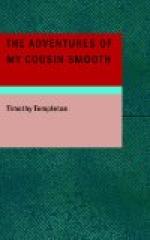“Smooth being a great man, as well as Mr. Pierce’s minister in general—and citizen Peabody being no less great in diplomacy, which he illustrated in the most substantial manner—it became necessary to make a demonstration: to this end did friend George delegate his hospitality in an invitation to dine with him at Blackwall. George was large and loose of figure, possessed a broad, honest face, bright with kindness, candor, and firmness: added to which a well-developed nose; a soft, yet watchful eye a mouth indicating gentleness; and a broad, benevolent chin, finished the make-up of the external man—if we except a neat pair of brown whiskers, and a head of dark youthful hair. Citizen George loved dearly his country, and was altogether a man who meant well, nor ever forgot those of his countrymen who reflected honor on their country when abroad. He had no genius for politics, had never aspired to the class par excellence; no, he espoused none of their dogmas; he let littler minds revel in such luxuries. The means by which little demagogues find themselves great politicians could reflect no fame to George: he served his country with less noise and more effect. If he was quiet and unassuming; if he loved his country to a fault, that fault was his own, not his country’s. How much more to be praised is he who seeks when in foreign lands to sustain the simple but grand spirit of our institutions! For sustaining the simplicity of our institutions is friend George most to be praised. The object of his labor was the establishment of a simple but real and effective diplomacy, from which international benefits of great worth might result. A few here and there had doubted the quality of his diplomacy; but no one bold enough to question his abilities as a diplomatist had yet been found. It is not what we are supposed to do, but what we really do, that ought to entitle us to respect. And had not citizen George done more to promote a kindly feeling between the too boastful peoples of England and America than all our well-paid ministers, their court luxuries, and costly retinues thrown in? That citizen George would interpose for peace and international harmony, in the event of an unfortunate misunderstanding between the two countries, was equally certain; indeed he had more than once had occasion to view with feelings of commiseration those small jealousies against which great minds have to contend while seeking to carry out an enlarged policy. Painful as may be the assertion, it is nevertheless true, that whenever questions of an intricate nature arose those whose legitimate business it was to act in the matter were either moved by the narrowest aspirations of party, or, yielding to their own more contracted views, were disposed to keep alive dissensions blighting to their country’s best interests.




